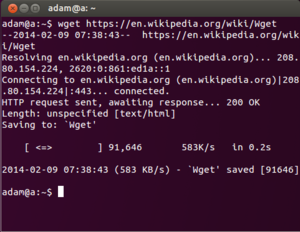Wget

|
|
| Developer(s) | Giuseppe Scrivano, Hrvoje Nikšić |
|---|---|
| Initial release | January 1996 |
| Stable release |
1.19 / 3 February 2017
|
| Repository | git |
| Written in | C |
| Operating system | Cross-platform |
| Type | FTP client / HTTP client |
| License | GNU General Public License version 3 and later |
| Website | www |
GNU Wget (or just Wget, formerly Geturl, also written as its package name, wget) is a computer program that retrieves content from web servers. It is part of the GNU Project. Its name derives from World Wide Web and get. It supports downloading via the HTTP, HTTPS, and protocols.
Its features include recursive download, conversion of links for offline viewing of local HTML, and support for proxies. It appeared in 1996, coinciding with the boom of popularity of the Web, causing its wide use among Unix users and distribution with most major Linux distributions. Written in portable C, Wget can be easily installed on any Unix-like system. Programmers have ported Wget to many environments, including Microsoft Windows, Mac OS X, OpenVMS, HP-UX, MorphOS and AmigaOS. Since version 1.14 Wget has been able to save its output in the web archiving standard WARC format.
It has been used as the basis for graphical programs such as GWget for the GNOME Desktop.
Wget descends from an earlier program named Geturl by the same author, the development of which commenced in late 1995. The name changed to Wget after the author became aware of an earlier Amiga program named GetURL, written by James Burton in AREXX.
Wget filled a gap in the web-downloading software available in the mid-1990s. No single program could reliably use both HTTP and to download files. Existing programs either supported FTP (such as NcFTP and dl) or were written in Perl, which was not yet ubiquitous. While Wget was inspired by features of some of the existing programs, it supported both HTTP and FTP and could be built using only the standard development tools found on every Unix system.
...
Wikipedia
